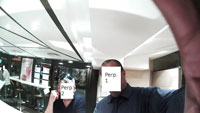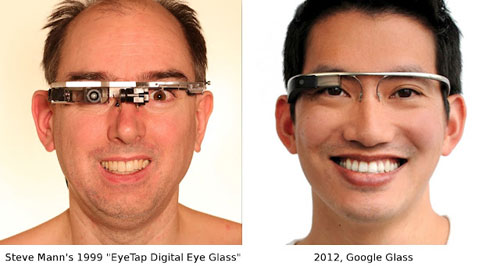Toronto “cyborg” claims he was roughed up in Paris McDonald’s for wearing Google-like digital glasses
posted Friday, July 20, 2012 at 12:18 PM EDT
 While the new Google Glass geeky camera glasses have received a lot of press, it turns out that even before these devices are in the marketplace, a recent encounter at a Paris McDonald’s may foreshadow the unexpected legal, moral and social problems they will create.
While the new Google Glass geeky camera glasses have received a lot of press, it turns out that even before these devices are in the marketplace, a recent encounter at a Paris McDonald’s may foreshadow the unexpected legal, moral and social problems they will create.
University of Toronto professor Steve Mann developed computerized vision aiding goggles for himself back in the 1980s, long before Google Glasses were even a gleam in Sergey Brin's eyes. Mann made them to deal with his own vision problems and he continues to wear his latest model which uses computer-controlled laser light.
The glasses are permanently attached to his head and he carries a small computer control device in his pocket. He is well known in Toronto and the local media has dubbed him “Toronto’s Cyborg.”
Professor Mann’s trouble began while on vacation in Paris, when he and his family went to eat at the McDonald’s on Paris’s touristy Champs Elysee. While standing on line, a McDonald’s employee told him that cameras were not allowed in the restaurant. Mann responded by pointing out that his glasses were necessary for enhancing his vision.
“I had brought with me a note from my doctor explaining this as well as documentation [about how the device works]. Since I had it with me, I showed it to the gentleman. After he finished reviewing it, he decided to accept us as customers.”
However, things didn’t end there.
"We sat down to eat our meal and I went over to use the toilet. On the way someone stopped me and started swinging at me. He said something about cameras also, but he was totally hysterical. Just sort of swinging his left hand around, acting kind of strangely."
"At first I thought it was just some lunatic. Then he brought me over to two other people, one of them was wearing a McDonald’s shirt and had a dust pan and a broom. It would appear they’re representatives of McDonald’s. So I tried to calm him down and I gave him the doctor’s letter and the other documentation. He handed it to the other person, who took a look at it for a while and then he ripped up the letter from my doctor."

In an interview with the National Post’s (Canada) Jake Edmiston, Mann was asked what he thought about a ban on taking pictures.
“It’s morally and ethically acceptable to capture your own experience. A person with Alzheimer’s might wear a camera or recorder to help remember. We live in a cyborg age in which our functioning is often assisted by computation. It should be up to the individual to decide how they’re going to perceive and sense the world around them. The problem is there’s no real distinction between recording and remembering in the cyborg age.”
Despite some damage to the glasses during the fisticuffs, his camera was able to record a video of the event, which Mann has loaded into a blog post on Facebook. (See a still from that video at the top of this story.)
His experience may well be the first of many moral and legal issues raised by video capture glasses. In a cyborg world, where millions of people record every second of their lives, existing laws and social standards may well come into conflict with the new reality.
McDonald’s says it is looking into the matter and claims that its employees only remember a “polite encounter.”